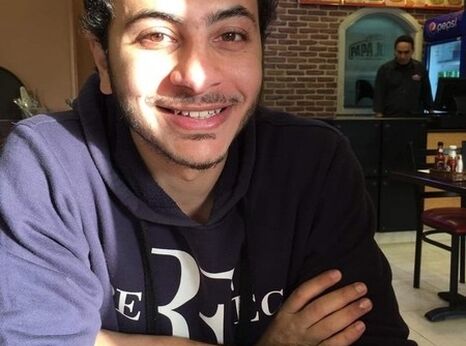Egypt: Student unjustly jailed over 'false news'

Ahmed Samir Santawy is a researcher and a student of anthropology at the Central European University in Vienna, Austria. His research generally addresses women's rights, with a focus on the history of reproductive rights in Egypt.
During the hearing on 22 May 2021 before the State Supreme Security Prosecution (SSSP), a special branch of the Public Prosecution responsible for prosecuting crimes that relate to “state security”, Ahmed Samir Santawy told prosecutors that he had been beaten the previous day by the deputy warden of Liman Tora prison. His lawyers requested his transfer to the Forensic Medical Authority to examine his injuries. The family of Zyad el- Elaimy, a former parliamentarian and human rights lawyer arbitrarily detained in Liman Tora solely for his peaceful political activities and expression of his opinions, also lodged a complaint with the public prosecutor about prison officials’ beating him and Ahmed Samir Santawy on 21 May. On 25 May, the Ministry of Interior denied the allegations which it attributed to media channels supportive of the outlawed Muslim Brotherhood. No investigations have been conducted into these claims, as well as Ahmed Samir Santawy’s previous complaints to prosecutors of being subjected to enforced disappearance, torture and other ill-treatment following his arrest on 1 February 2021 by the National Security Agency, a specialized police force.
The inability to appeal verdicts by emergency courts denies defendants the fundamental fair trial right to have their conviction and sentence reviewed by a higher tribunal. Ahmed Samir Santawy’s right to have a reasoned written judgement has also been flouted as to date his lawyers have not been allowed to examine or photocopy the verdict, hampering their ability to submit a request to the president not to authorize it. The conviction of Ahmed Samir Santawy over social media posts by an exceptional court sends a chilling message on the erosion of rule of law in Egypt, and the use of such courts as a tool of repression. Following the verdict, Ahmed Samir Santawy started an open-ended hunger strike, reportedly telling his family during a prison visit that there was no difference between prison and death.
Blanket prohibitions on the dissemination of information, based on vague and ambiguous concepts such as “false news” or “spreading misinformation”, are incompatible with international human rights law and standards since they do not meet the principles of necessity and proportionality. The UN Human Rights Committee has stated that general prohibitions of expressions of an erroneous opinion or an incorrect interpretation of events contravene article 19 of the International Covenant on Civil and Political Rights, to which Egypt is a party. Under international law, detention is arbitrary even if allowed by national law if it results from the exercise of human rights or is on the basis of unfair proceedings.
Egypt has been under a state of emergency since April 2017, with the president extending it every three months with parliamentary approval, thereby circumventing the six months limit set by the Egyptian constitution.